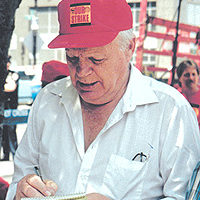The attack on the World Trade Center evoked a spontaneous display of solidarity from the U.S. working class.
Tens of thousands, from New York and all over the country, dropped what they were doing and rushed to volunteer at the site of the tragedy. They didn’t weigh the risk, and they didn’t count the cost. Millions lined up to donate blood, as well as money – donations to relief funds exceed $1 billion.
Generosity is not just a working-class characteristic. Businesses and their owners and executives have donated, often generously. But businesses exist to make profits – if they don’t make profits, they die. And it hasn’t taken long for profits to be the number-one priority of corporate America.
Almost unanimously, the media celebrated when the stock exchange reopened six days after the attack. The evening news featured Wall Street ‘experts’ encouraging people to invest in the stock market, a theme that has been repeated in newspaper ads by leading mutual fund managers. Ordinary citizens withdrew money from their savings banks, telling brokers they wanted to invest in the stock market as a demonstration of their patriotic confidence in America.
But the rich, as a class, were concerned with more practical considerations. Maria Lagomasino is head of the private banking division at JP Morgan, managing the fortunes of families with an average wealth of $100 million.
While others rushed to offer aid to the victims on Sept. 11, Lagomasino rushed to her office to contact her clients around the world.
‘Since our clients were rich, our number one concern was their staying rich,’ she said.
If it was patriotic after Sept. 11 to invest in the stock market, Lagomasino advised her clients to sell out America. ‘Clients with a lot of their wealth in cash were cautioned against rushing back into the [stock] markets,’ according to The New York Times.
By Sept. 10, the Dow Jones Industrial Average had fallen to $9,600 from an August plateau around $10,400. After Sept. 11, it continued to fall sharply, bottoming out below $8,300 10 days later. It has since been on an erratic trajectory upward, almost regaining its Sept. 11 level at this writing.
It’s easy to read too much into the short-term fluctuations of the Dow. But despite Sept. 11, and despite an increasing gloom about the state of the economy, an element in the market’s recovery is the glee felt by the wealthy elite at the huge profits they hope to enjoy through corporate bailouts and tax cuts, an unlimited budget for military contractors, tax cuts for the rich and other attacks on workers’ wages and benefits under the guise of ‘share the sacrifice.’
The capitalist class grabbed for themselves all the benefit of the economic boom of the 1990s. Now they are determined to use their control of the White House and most of Congress to maintain and increase their wealth during the recession. Continuing the precedent they set on Sept. 11, they will seize every opportunity to profit from the economic disaster afflicting the people.
A New York Times headline summarized the relationship between stock prices and politics: ‘Stocks Rally on Tax Break Plan.’ President Bush had just proposed large, permanent tax cuts for corporations and wealthy individuals, while spending only a small amount in temporary benefits for a few of the victims of the crisis. ‘Investors cheered the president’s economic stimulus proposal, and sent stocks upward,’ according to the Times.
So in some cases, good news for the Dow is bad news for the working class. But I would close on a note of hope: The AFL-CIO has introduced an economic stimulus plan that really meets the needs of low- and average-income workers and unemployed. It provides jobs, services and infrastructure where they are needed. With a big enough and militant enough movement, it is possible to win such measures – and pay for them by taxing the rich. If we can’t do it in this Congress, maybe in the next.
When such a program passes, I’ll bet the stock market falls, but workers around the country will have cause to celebrate.

MOST POPULAR TODAY

High Court essentially bans demonstrations, freedom of assembly in Deep South

Zionist organizations leading campaign to stop ceasefire resolutions in D.C. area

U.S. imperialism’s ‘ironclad’ support for Israel increases fascist danger at home


UN warns that Israel is still blocking humanitarian aid to Gaza



Comments